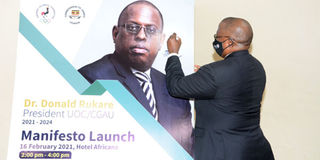Rukare to champion UOC, NCS harmony

Signed. Donald Rukare signs his manifesto after he was announced unopposed for the post of UOC president ahead of the February 27 election. PHOTO | JB SSENJUBUGE
What you need to know:
- Key points. The incoming Uganda Olympic Committee presidnet announced four areas of focus - including support to athletes and officials, facilities, funding and strategic partnerships.
Dr Donald Rukare is set to follow in the shoes of the late Major General Francis Nyangweso as head of the country’s two formidable sports bodies.
The long-fallen administrator served as head of the Uganda Olympic Committee (UOC) from 1981 to 2009 but also had a stint as general secretary National Council of Sports (NCS) in his formative years.
Rukare, who currently serves as chairman of the NCS board and general secretary at UOC, was yesterday announced unopposed for the post of UOC president ahead of the February 27 election – that will be run by returning officer counsel Sim Katende.
Rukare’s status after that elective assembly will be a rarity as the bodies have been at loggerheads, jostling for national supremacy, for eons. In fact after Nyangweso, Makerere sports tutor Peninah Kabenge is the only other person known to have served both bodies – as UOC general secretary and committee member at NCS.
Rukare’s one year at NCS has helped both bodies bury some of their differences but he – as head of 30 federations under UOC – must continue promoting this harmonious relationship, especially with the other 21 federations recognized by NCS that could feel hard done by his new status.
“Our mandate as UOC is very small; to promote Olympism and prepare athletes for Games,” Rukare said during the launch of his manifesto at Hotel Africana yesterday.
“NCS is a wider platform to promote sports in the country. But also as a chairman (NCS), I just chair quarterly meetings. NCS has 11 council members and employs 61 staff members, who can support all federations to the extent that funds available allow.
Other than that, the 20 other federations can be friends of the Olympic family as there are some like woodball, which our members can learn (best principles of administration) from. Others like climbing and dancing are even possible candidates to join UOC in the future.”
The plans
At his manifesto launch, where the media – having already attended a press conference at the UOC offices in Lugogo that endorsed him unopposed – tasked him more on his actionable pointers rather than strategies, Rukare was joined by family members, friends, presidents from various sports federations endorsing his leadership and outgoing UOC president William Blick as his plans were unveiled digitally.
“Our four areas of focus are support to athletes and officials, facilities, funding and strategic partnerships. We need to change our mindset from seeing sports as recreational to something that can contribute to the national development fund and improve livelihoods through jobs and returns on investment,” Rukare added, giving the World Cross Country Championships of 2017 as an example after they brought into the country about $3m (about 1.1bn) at the time.
Mature politics?
Rukare – a human rights lawyer and lecturer – was also flanked by six of the incoming members of his executive, who also returned unopposed – a major contradiction for the Blick legacy they inherit. Blick’s administration has been majorly praised for training over 1,900 people in sports administration.
Suffice to note that the UOC election rules require contestants to have served for at least four years on the executive committee of member federations. This technicality could have ruled out majority of the trained group as the courses where more pronounced in the second term (2017-2021) of Blick’s tenure.
“I am not disappointed (that there were no opponents) but happy that UOC has mature-minded politics where we can agree on our next president and ask our members to build an agreeable team around him,” Blick said at the earlier press briefing in Lugogo.
Blick had, however, already come under criticism for influence peddling, when he endorsed Sadik Nassiwu for volleyball president ahead of then incumbent Hadija Namanda. His further endorsement of Rukare has been likened to promoting monarchical politics in sport.
“All I have done, at a personal level, is endorse a candidate. That does not stop others from standing. And I do this because I do not want to leave UOC with politics of blackmail. When we came about 10 years ago, there was a lot of turmoil, where people met in the night to exchange money over positions,” the outgoing president but also serving as an IOC member, said.
For this group of UOC leaders and their incoming leader, this election was opportunity to continue consolidating on what they have built since 2012.
UOC Nominated Candidates - Unopposed
President: Donald Rukare
1st Vice President: Dunstan Nsubuga (Hockey)
2nd Vice President: Moses Mwase (Swimming)
General Secretary: Beatrice Ayikoru (Athletics)
Asst. GS: Lydia Ssanyu Dhamuzungu (Hockey)
Treasurer: Sadik Nassiwu (Volleyball)
Executive Board Members
Female: Ann Mungoma (Shooting)
Carolynne Joanne Adongo (Fencing)
Contested
Executive Board Members
Male: Simon Peter Komakech
Abdul Nasser Sserunjogi (Basketball)
Richard Mcbond Asiimwe (Archery)
Godwin Arinaitwe Kayangwe (Rugby)




